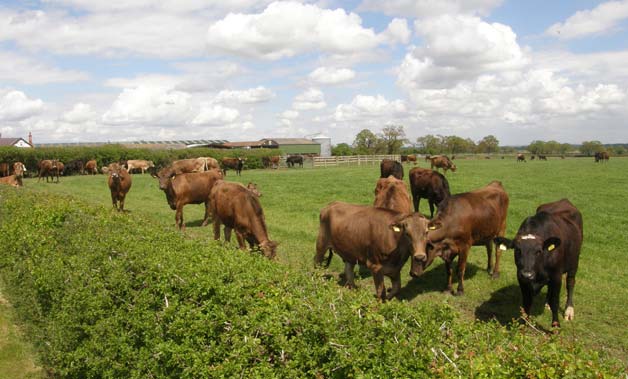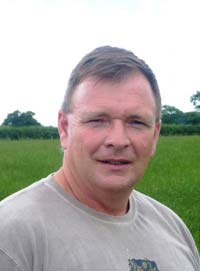Agriculture can resolve our ecological woes
By Richard Tomlinson, Lodge Farm, Wrexham.
Cows at Lodge Farm
In an interview with “The Guardian” late last month, the Government’s chief advisor, Sir Mark Walport, advised that we should concentrate less on denying that climate change is happening and focus more on how we can respond to it.
Contributing almost 10% of the UK’s GHG emissions, agriculture attracted comment from Richard Tol, an economics professor at Sussex University who specialises in climate change and energy issues, who suggested that “if you are serious about cutting [GHG] emissions, it means giving up cows’ milk and giving up cow meat.”
As a fifth generation, dairy farmer, I would suggest that agriculture may instead be able to resolve our ecological woes.
Having farmed organically for the past 15 years, I am passionate about my land and, most importantly, the soil that it contains. Soil, in my opinion, is the bedrock of our society yet, I’m afraid to say, society seems to be hell bent on destroying it.
The biological health of our planet is our number one priority, yet we continue to ignore its own biological requirements. Whilst mankind concerns itself with the increasing levels of CO2 emissions, it fails to consider the whole carbon picture, and to recognise that carbon itself is not the problem, rather that there’s too much of it in the air and not enough locked in the ground, where it can lend fertility to the soil. Indeed soil is our most natural and cost effective carbon sink, with the ability to hold more carbon than the atmosphere and the world’s plant life combined.
I find it incredibly alarming that America’s largest export is topsoil and that Iran has been forced to source much of its wheat this year from that most unlikely of go-to countries, the US. 90% of the world’s cropland is losing soil, largely to wind and water erosion, at 13 times the rate at which soil is being formed. Indeed, one could say that photosynthesis is our only true wealth. Without it, soil becomes so degraded that the food we grow lacks nutrients, rain runs off it, bringing drought and ‘desertification’, and whole societies are uprooted.
Here in the UK, we may think of ‘deserts’ as immense, featureless expanses of sand, inhospitable areas in distant lands, like the Sahara, the Kalahari and Death Valley, where the sun rages incessantly and it never rains. However, if we acknowledge desertification as the process by which once fertile land loses all of its nutrients, we may begin to recognise that the problem is becoming a very real one at home.
The quality of our soil greatly determines the nutritional value of our food. Over the last 80 years, the calcium content of an apple has almost halved, whilst the levels of iron, phosphorous and magnesium have fallen by over 80%; UK Ministry of Health research has shown that the levels of iron in a steak today are around half of what they were 50 years ago. Both of these facts are a consequence of a dilution of nutritional content in the land, accelerated by years of poor land husbandry and growing crops for maximum yield.
Our soil is not only the prime source of our food, it also absorbs rain and retains vital water, rather than streaming it away as it would if exhausted of organic matter. Every 1% increase in soil carbon has the capacity to hold an additional 60,000 gallons of water in each acre. Hardly surprising, then, that it is home to over 95% of terrestrial life forms, or that there are as many living organisms in a teaspoon of healthy soil as there are people on the planet, and vitally important when you consider that worldwide demand for water will soon be 40% greater than what is available.
But perhaps most significantly of all, our soil provides a solution to the crisis of excess CO2 in the atmosphere, with its far reaching, global consequences. Ohio State University research has established that soil carbon restoration has the capacity to store around one billion tons of atmospheric carbon per year, enough to offset around 10% of total annual CO2 emissions and around a third of the annual human related emissions to the atmosphere.
We can’t switch off our carbon emissions but we can sequester them to the ground; it’s incredible to learn that if the topsoil of all the land that we currently farm and graze were increased in depth by just 1.6%, atmospheric CO2 levels would be returned to pre-industrial levels. Since around 1850, twice as much atmospheric CO2 has been derived from farming practices as from the burning of fossil fuels and, in the past 150 years, between 50% and 80% of organic carbon in the topsoil has gone airborne. Indeed, the carbon pools of the world’s agricultural soils have reportedly been depleted by between 50% and 70% (up to 100 billion tons of carbon).
The antidote to this rapid oxidation is regenerative agriculture: working the land with the goal of building topsoil. This turns the conventional approach to farming upside down: rather than focussing on growing crops, the intention is to grow the soil.
Richard Tomlinson – 5th generation dairy farmer
Every day I walk my fields, frequently moving my cows from one paddock to the next, just as soon as they have nibbled the grass sufficiently to stimulate plant and root growth, and they have trampled the ground to a level at which water can seep in and seeds can germinate. And whilst their dung restores much needed carbon to the ground, methane from the dairy slurry is converted into thermal and electrical energy through an Anaerobic Digester, whilst producing nutrient-rich, chemical-free fertilisers for the land.
I see soil as the melting pot for our converging environmental, social and economic crises (excess atmospheric CO2, drought, floods, wildfires, food scarcity, desertification, even obesity and malnutrition), enabling us to redress these seemingly insurmountable problems. Since soil is integral to so many biological processes, nurturing it and improving it provides us with many paths towards ecological renewal – with returns far greater than what any of us might see at our feet.
Franklin D. Roosevelt, 1937: “A nation that destroys its soils destroys itself.”













